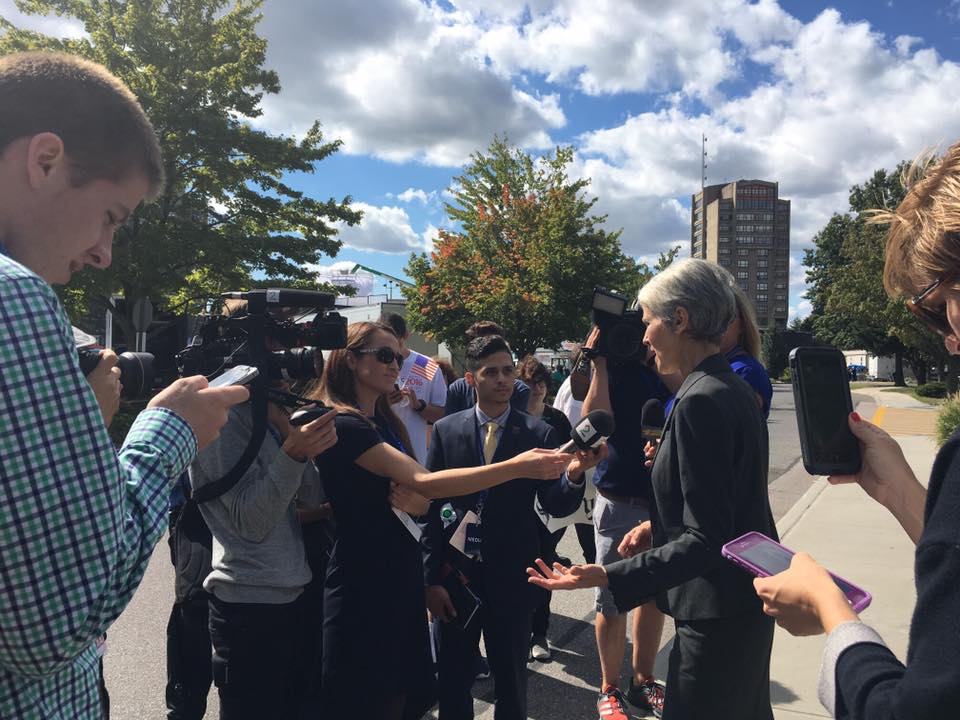Originally published at MintPress News.
AUSTIN, Texas — Protesters at the first presidential debate last night found themselves forced into a “free speech zone” about a quarter mile away and separated from the actual event site by a 6-lane highway.
Many others had difficulty even making it that far, thanks to extensive police roadblocks and “an absurd level of security,” according to journalist Abby Martin, the host of “The Empire Files” on teleSUR English, who spoke with MintPress News on Tuesday after covering Monday’s protests.
Buses of activists never made it to protest, ppl forced to walk miles to get to "free speech zone"—cops turned everyone around #Debates2016
— Abby Martin (@AbbyMartin) September 27, 2016
Martin continued:
Thousands of police set up roadblocks and cutaways through neighborhoods, forcing people to walk up to three miles simply to reach the “free speech zone.” It took us over an hour to get there on foot.
“Part of the idea of free speech and redress of grievances is being able to speak to and at the people that you are trying to get a message across too,” said Susan Gottehrer, chapter director of the Nassau County New York Civil Liberties Union, and one of several observers from her organization at the protests, in an interview with MintPress.

Gottehrer told us that she has serious concerns about the degree to which the intense security precautions impeded protesters’ constitutional right to freely assemble. “The debate itself was being held on private property, so that, in and of itself, provides limitations on the protection of First Amendment rights,” she noted.
While Donald Trump and Hillary Clinton debated inside the David S. Mack Sports and Exhibition Complex on the Hofstra University Campus, the free speech zone, officially termed the debate’s “Public Area,” was located outside Hagedorn Hall, located over 1,000 feet away across the busy NY-24 state highway. Protests were banned on the entire north side of campus, across the highway and some Green Party supporters were arrested for protesting outside the actual debate site, after debate officials turned away Green Party presidential nominee Jill Stein.
Protestors blocking traffic in/out of #HofDebate16 by the Nassau Coliseum (I'm stuck in the jam on a media bus) pic.twitter.com/zJXw2cvh4z
— Sonia Rincón (@SoniaRincon) September 26, 2016
https://twitter.com/DrJillStein/status/780570153528406016
Speakers had to sign up in advance to use the provided stage in the free speech zone, and most protesters instead gathered outside on a nearby public sidewalk.
"Where's the money?" Haitian activists protesting the theft of earthquake aid & pillage of Haiti by the Clintons outside #Debates2016 pic.twitter.com/jAx6cUxiUG
— teleSUR English (@telesurenglish) September 27, 2016
Some didn’t even make it that far, thanks to the difficulty of reaching the designated protest area in the first place. Martin said:
We spoke to several people who were steered away by police telling them wrong directions. It seems like there was a purposeful tactic to deter people from finding the protest site. One Jill stein supporter told us three whole buses of stein supporters never even made it to the event because of all the confusion.
Gottehrer suggested the long distance between security checkpoints and the free speech zone could have prevented many people with disabilities or other physical limitations from protesting. “That also creates a physical limitation to people being able to express their First Amendment rights.
According to the Hofstra University website, security precautions set up by the Secret Service, but multiple law enforcement agencies took part. Gottehrer reported that security checkpoints, operated by Nassau County Police, sometimes became overloaded and required another time-consuming wait before protesters could begin reach the protest site.
The current situation to enter the Free Speech Zone outside the prez debate. #Debate2016 pic.twitter.com/FcceWxzpXe
— Colorlines (@Colorlines) September 26, 2016
Gottehrer told us that her organization had negotiated extensively with the county police, who she said overall did a good job. “The Nassau County Police understood that they were not to be confiscating signs or things like that.”
However, Martin told us some protesters “weren’t let in with guitars, hairpins, signs and bullhorns.”
How is it ok that there was a "free speech zone" at the debate last night for protesters. Last time I checked you had free speech everywhere
— Old Man Carrick (@andyfervs) September 27, 2016
“One can only imagine how many more people would’ve been protesting if we didn’t live in an Orwellian police state,” Martin concluded.